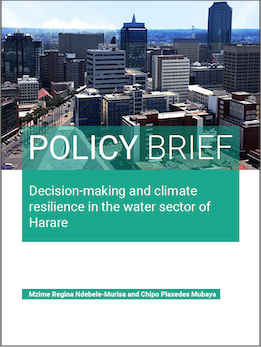This policy brief is based on discussions and recommendations from studies funded by the IDRC-African Climate Leadership Program (AfriCLP) and the Natural Environment Research Council (NERC) and START’s Africa Global Environmental Change (GEC) project administered under the Future Resilience for African CiTies and Lands (FRACTAL) program which focused on decision-making and climate resilience in Harare. These studies were conducted between 2016 and 2018. The common issues that both projects addressed include:
- Examining the nature of climate change risks and vulnerabilities in relation to water service delivery
- Understanding processes and outcomes of decision-making to mainstream climate change adaptation in cities across southern Africa
- Potential adaptation options in this context
The brief summarizes the context of climate change, variability and water in Harare to contribute to the existing knowledge base on the city’s vulnerability and risks as well as to inform future, sustainable policy, planning and governance of the city in these sectors. The brief suggests a suite of recommendations for the development of the city in the water sector as provision of relevant climate information by the research fraternity; continuous undertaking of risk and vulnerability assessments; setting up of a climate change department/unit within and by the City of Harare which should also ensure optimal resource mobilization for infrastructural development; institutionalization and enforcement of regulations to prevent infrastructural development in areas not serviced with potable water and sewerage while at the same time working on provision of equitable potable water for all citizens. Then both the City of Harare and Government should facilitate an integrated/holistic approach in water resources management in order to avoid overlaps.



